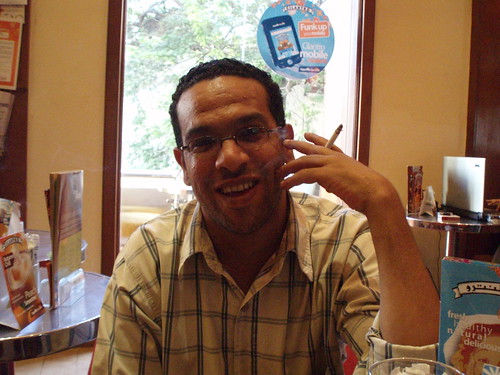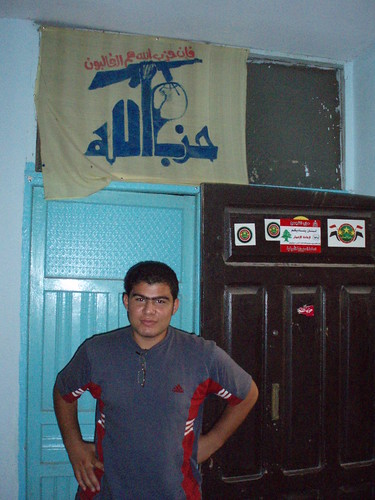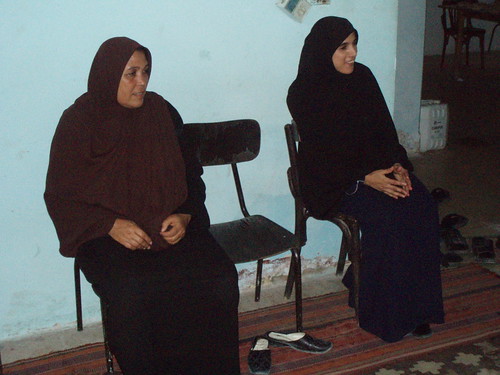I traveled to Al-Arish last weekend, to do some research on
Islamic militancy in Sinai. I’ll spare you the horror stories of torture I heard from relatives of terror suspects. I may post something about it in the future, but for now you can check out HRW’s report on the security crackdowns against Sinai Bedouins following the October 2004 Taba bombings:
Mass Arrests and Torture in Sinai.
While I was there, I decided to visit the Tagammu Party office, located in downtown Arish, to follow up on the case of detained Kefaya activist Hassan Abdallah, the coordinator of Sinai Youth For Change.
State Security agents broke into Hassan’s house in Arish last month, and kidnapped him. Later, they issued death threats against his two brothers Wael and Mohamed who have taken refuge in the Tagammu office, and have been staging a continuous sit-in.
At the office, I was met by veteran leftist activist Ashraf Ayoub, who’s been civil rights and pro-Palestinian campaigner in Arish since 1984, his 19-year-old son and Sinai Youth For Change activist Shadi, Hassan’s two brothers, mother and sister.
Hassan and his family joined the Tagammu Party during the post-Taba bombings security crackdowns. Hassan’s mother, Kawthar, and his sister Soheir who works as a school teacher, led spontaneous demos by the mothers and women relatives of detainees to protest the widespread torture and kidnappings by State Security agents. They teamed up later with veteran activists like Ashraf Ayoub, and decided to become active members in the left-wing party branch.
“The threats never stopped,” Kawthar said. “State Security Colonel Essam Amer and Major Hussein Mansour told us several times to leave the party, but we refused.”
Hassan’s brother Wael, 22-year-old English literature graduate, had been detained by security 29 October, 2004, part of the mass crackdown on Arish. He was kept for three months at the State Security bureau in Arish, and another three months in Damanhour prison. He told me he was brutally tortured by interrogators, who stripped him off his clothes, threatened him with rape, suspended him from the ceiling with his hands tied to the back, applied electric shocks on several parts of his body—before releasing him saying, “Ma3lesh (never mind), you are not involved.”
The other brother Mohamed, a 32 year old school teacher, was also picked up by State Security on 7 December 2004, and detained for three months, where he received similar treatment.
The younger brother Hassan, attracted the security’s attention, while chanting “Down with Hosni Mubarak” during pro-Lebanese resistance demos in Arish last July.
“State Security officers phoned Hassan several times, with threats and intimidation to leave Tagammu and quit activism,” his mother Kawthar said.
Finally, State Security agents stormed the family’s house on the dawn of 7 September, while Hassan was asleep, his mother recalled. “He was asleep, in his underwear, when they grabbed him. He shouted requesting to see a judicial warrant. They told him, ‘We are State Security. We don’t need a warrant.'”
Hassan was taken in his underwear and thrown into the police van. He was not allowed to take his eyeglasses with him. His two brothers Wael and Mohamed were present in the house, but security agents were not interested in them. On the following day, State Security Major Hussein Mansour phoned in with more threats if the Abdallahs don’t cease their activism, and requested the two brothers to show up the SS Arish bureau for questioning, and to “bring clothes for their naked brother,” the mother said. The two refused, saying the officer’s actions were illegal. Fearing for their safety, the Abdallahs took refuge in the Tagammu office, and said if SS wanted them they could come and get them from the office. For a week, security forces used to raid their empty house every night and smash its furniture. They also told the mother several times her two sons were “considered fugitives now, and if they are seen anywhere in the streets they will be killed.”

Hassan was kept in State Security Arish bureau for a week, then he was transferred to Bourg Al-Arab prison, still without his clothes or eyeglasses–just his underwear, according to his mother, as State Security officers refused to receive the clothes and food his sister and his friend Shadi Ayoub tried to bring him while he was still locked up in Arish.
Hassan has not been presented to the prosecutor still, and his two brothers are still holed up in the Tagammu office for fear of their safety










